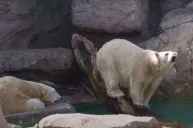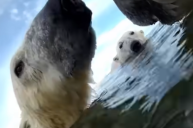The Calgary Zoo revealed the necropsy results of its beloved polar bear, saying it drowned after sustaining injuries during "rough play." According to Tuesday's news release, seven-year-old Baffin suffered a tracheal injury on July 19 while playing with the other bear in the exhibit.
In a statement, Colleen Baird, the zoo's director of animal care, explained that Baffin and the other bear, eight-year-old Suki, were longtime habitat mates and companions. "They displayed many natural polar bear behaviors, including playing daily in and out of the water," Baird said. "The type and intensity of play on the day of the incident appeared to be no different than the type of play their caregivers witnessed from them on a daily basis."
Besides his injuries, Baird added that the necropsy conducted by an independent wildlife pathologist showed that Baffin was in excellent health. She also said there was no evidence of heat-related stress as previously believed. "Although the necropsy results are conclusive about the cause of Baffin's death, they offer little solace to our team that loved Baffin so deeply," she said.
Baffin the beloved polar bear
According to the news release, officials rescued Baffin as an orphaned cub when he was less than a year old. His rescuers brought him to the Leatherdale International Polar Bear Conservation Centre at Assiniboine Park Zoo (APZ) in December 2017. Eventually, the zoo introduced to the other bears at APZ and lived in APZ's Journey to Churchill habitat. However, last fall, Baffin and Siku, who was also rescued as an orphaned cub in 2016, were transferred to the Taylor Family Foundation Polar Bear Sanctuary.
In a fact sheet, the organization Polar Bears International reports that there are 19 populations of polar bears in the wild around the world. While about 60% of the population lives in Canada, they also live in Alaska, Russia, Greenland, and Norway. Combined, their total population amounts to approximately 26,000. In the while, polar bears live on average between 15 and 18 years. However, in captivity, they can live up to 40 years.




